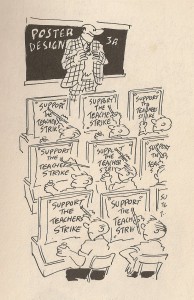There could be a new role for Local Authorities if we get a change of government at the next election; at the least they will have to deal with free schools going bust because they’re not economically viable, surplus places where anyone and his dog have been allowed to open schools, exercising some scrutiny of academies which underperform and, dare I say it, intervening when required. They could do rather more if an incoming government were brave enough and wanted to restore local democracy and accountability. They could even restore a school improvement mission, by which I do not mean a standards, accountability and Ofsted mission. They could restore a focus on teaching and learning…kind of make schools have something to do with education for a change.

I was lucky enough to work as 14-19 phase and link adviser for a local authority a few years ago. The county secondary schools had been almost entirely organised on a 11-13 and 14-19 basis and I had a chief officer who was willing to give me my head. Statistically the authority performed extremely well at KS3 and about average at KS4 compared with statistical neighbours. This suggested issues around continuity and progression and the authority persuaded its heads that the review might be timely. There was plenty of suspicion that it might presage a reorganisation so initially there wasn’t much trust about.
We set up a cross-phase steering group, looked at attainment data in detail, sought the views and opinions of all secondary headteachers and leaders and produced a report with clear recommendations for improvement aimed at the authority and schools.
Continuity and progression was indeed the key issue. Action taken included:
- two consistently underperforming subjects D&T and MFL were identified (through NCER subject residual analysis) for support and advisory teachers were seconded from schools to lead their improvement; subject focussed improvement plans were developed and implemented;
- additional funding was obtained from elected members to assist with equipment and training in these subject areas, conditional on common planning across cross-phase ‘families’ of schools;
- further funding subsidised the purchase of common added value measures across all schools (Midyis and Yellis) and support for their effective use;
and - induction guidance was developed and produced to ease phase transition.
All this took place in addition to the consistent support for individual schools based around regular headteacher/adviser dialogues and a central training programme.
Around 60 secondary schools worked in partnership with a Local Authority in the best interests of young people. The result, oddly enough, was consistent improvement in attainment and achievement which outstripped our statistical neighbours. KS3 continued to outperform KS4 (not least because KS3 was an output indicator for 11-13 schools) but the crucial measure of KS2 to KS4 improvement showed that overall we did better than our statistical neighbour authorities and improved at a faster rate. The system of school organisation worked and could be made to work even better. An improvement strategy underpinned by research and data analysis, characterised by partnership working, transparency and trust and funded by elected members made a difference.
Of course it couldn’t last and could never happen now. Ofsted focussed on school performance not system performance. Free school meals uptake at 14-16 was bound to be low compared with 11-16 schools and added value KS3-4 always looked distinctly average. KS2 to KS4 added value was clearly not relevant so our upper schools were often severely judged. Link adviser work became an Ofsted dominated script to be repeated every year. The introduction of SIPs and an even more bureaucratic script and process fractured the relationship between LA advisers and headteachers. High schools wanted to teach KS4 so the county structure fragmented. Academisation was the final straw. The advisory service virtually disappeared as it has since across the country. School improvement has been devolved to school level and meta-analysis and widescale improvement programmes are long-gone along with national advisor networks where good practice could be shared and built on. A number of schools, once high achieving, are in trouble and while it may be deemed the local authority’s responsibility (even if they are academies) there’s really not much the authority can do any more.
Not to worry, market forces and rigour will sort it all out and at least schools can escape that local control, as long as they exchange it for academy chain and Govian (Morganatic?) oversight …………..oh yes and control.